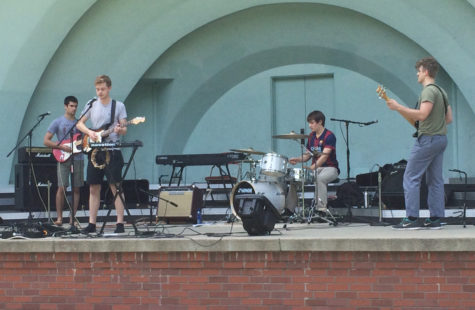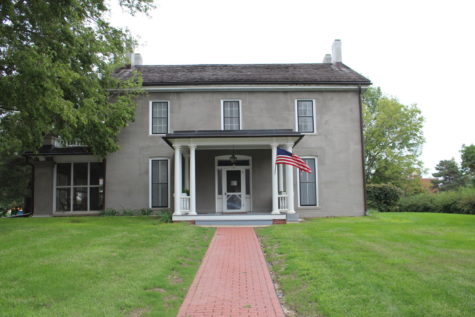George Work, John Gilbert, and Dmitri Shteinberg: Musical bonds that formed into a CD
November 17, 2014
Through the recoding of a new CD, a musical bond and friendship has formed between an Iowa State professor and his two colleagues.
Iowa State University cello professor George Work is part of a recently released CD that has gained the praise of critics and aided in the Grammy nomination for the CD’s producer. Cellist George Work, Violinist John Gilbert and Pianist Dmitri Shteinberg performed the Weill, Ibert, Berg CD along with the Baton Rouge Symphony Chamber Players.
“John Gilbert and I attended the Eastman School of Music together, and are very old friends,” Work said. “Since school, we have and performed together at various festivals, including the Schlern International Festival, the University of Minnesota’s “Bravo!” summer festival, the Iowa State Summer Chamber Music Workshop, and the “Colors of Music” festival in Barrie, Ontario.”
Gilbert was connected to both Shteinberg and the Baton Rouge Symphony Chamber Players, having played many festivals and venues with him and having been a previous conductor for them respectively.
“I was born in Moscow to a family of musicians,” Shteinberg said. “My later education took place in Tel-Aviv and New York. I have worked as a piano professor in Richmond, Virginia, and now work at UNCSA. I know George Work through John Gilbert, violinist.”
Gilbert asked Shteinberg if he would be a part of the recording since he seemed like the perfect pick as a piano soloist for the Berg piece since Work and Gilbert felt simply the Weill and Ibert pieces weren’t enough to do the recording.
“John (Gilbert) had performed the Weil many times, as I had the Ibert. It is often very advantageous to have a few unusual pieces in one’s repertoire, and neither of these pieces is everyday concert fare,” Work said.
Through previous CD recordings, Work had built an ongoing relationship with Sono Luminus Recording, formerly Dorian Recordings. When Work presented the Weill, Ibert, Berg CD idea to them they were very enthusiastic and from there Work, Gilbert and Shteinberg were in business to record.
“Dorian – Sono Luminus, or Sono Luminus as it is now called, is an audiophile label, so the Weil, Ibert, Berg was recorded in both ordinary and Surround Sound formats.” Work said.
This recording was the first time Work performed a concerto with an orchestra, specifically a wind ensemble.
For this recording, the three pieces being performed were “Concerto for Violin and Wind Orchestra, Op. 12” by Kurt Weill, “Concerto for Cello and Winds” by Jacques Ibert and “Chamber Concerto for Piano, Violin and 13 Winds” by Alban Berg.
“Recording a concerto is different in several ways from recording chamber music. You are much more ‘on the clock,’ orchestral musicians are contracted for a set amount of time, and you exceed that at your peril,” Work said of his experience recording the CD in in the concerto format.
As part of the recording experience, Work traveled to Baton Rouge, Louisiana, where he became familiar with the city’s culture and was also able to practice the concerto with the Baton Rouge Symphony Chamber Players.
The CD got its official release Sept. 25, 2014, through Sono Luminus Recordings and since then it has gained its share of acknowledgment and praise.
“The Surround Sound (recording version) in particular was sufficiently groundbreaking that it was part of a Grammy nomination for our producer, Dan Mercuio. The recording also received glowing reviews in ‘Fanfare’ and ‘Gramophone’ magazines,” Work said.
To follow this recording, Work, Gilbert, and Shteinberg are set to record violin and cello sonatas with piano by Samuel Barber and Richard Strauss this coming January.














